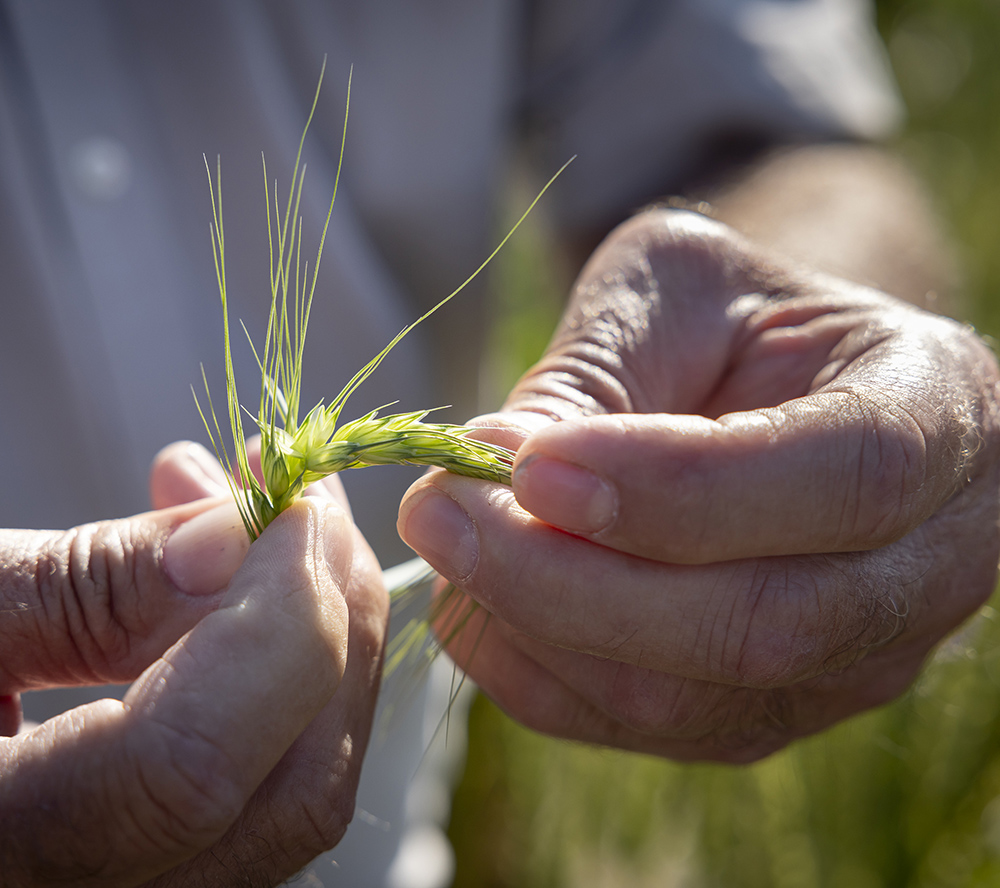Wheat in the South: LSU Research Tackles the Toughest Conditions to Protect a Vital Crop
May 20, 2025
Wheat can be a profitable rotational crop for Louisiana farmers, but the warm, humid Louisiana environment means that farmers have to choose varieties adapted to the state.

In the southeastern United States, and especially in Louisiana, wheat faces intense challenges. Too much rain, not enough rain, flooded roots, heat stress, disease, and insect pressure threaten this staple crop from the moment it’s planted.
And when pests and pathogens strike, they don’t just reduce yields—they can degrade grain quality enough to make it dangerous for human consumption.
Despite those challenges, or perhaps because of them, LSU AgCenter researchers at the Doyle Chambers Central Research Station in Baton Rouge have become national leaders in wheat variety development.
They’re developing new, public-sector wheat varieties tailored specifically for the South’s unique growing conditions. These improved varieties are then released to the private sector, helping farmers across the region plant smarter, harvest more, and earn a better living.
— Video by Grant French
“I had a graduate student tell me once that he didn’t think God meant for man to grow wheat in Louisiana. But that’s exactly what makes this the perfect place to develop resistant varieties.”
— Stephen Harrison, LSU professor in the School of Plant, Environmental and Soil Sciences
“We’re trying to develop wheat varieties that meet those challenges and produce well and consistently from year to year for growers in the Southeast,” said Noah DeWitt, an LSU AgCenter wheat breeder. “We focus on both abiotic stresses, like drought or flooding, and biotic stresses—things like fungal pathogens and insect pests.”
Located on the banks of the Mississippi River, the 2,000-acre Doyle Chambers station is a critical engine of agricultural innovation. It hosts research in agronomy, plant pathology, entomology, aquaculture, and animal science. And it’s where LSU scientists like DeWitt and longtime wheat breeder and professor in the School of Plant, Environmental and Soil Sciences, Stephen Harrison, put wheat through its toughest tests—intentionally.
“I had a graduate student tell me once that he didn’t think God meant for man to grow wheat in Louisiana,” Harrison said. “But that’s exactly what makes this the perfect place to develop resistant varieties.”
Because if a wheat line can survive Louisiana, it can thrive almost anywhere in the South.
That’s the philosophy behind the station’s research, which aims to increase profitability and sustainability for growers across Louisiana and beyond. By improving yield, reducing the need for costly pesticide applications, and enhancing resistance to diseases like Fusarium head blight, LSU’s wheat work helps protect the food supply and growers’ bottom lines.










— Photos by Eddy Perez
For Olivia Letlow, an LSU graduate student from Start, Louisiana, this work is personal.
“I'm actually from a food desert, and I saw the way that even though we grew a bunch of food in our town, all we had were a couple of small convenience stores. So, I really wanted to focus on food production in the state of Louisiana to benefit my state in my state,” Letlow said.
LSU’s impact doesn’t stop at the state line. In addition to its wheat breeding, the university coordinates the USDA International Oat Nursery, supporting 30 plant breeders across 24 countries. Varieties developed through this global collaboration are helping improve human health through better nutrition, higher yields, and greater resilience around the world.
Still, for Harrison—now in his 41st year—the heart of the work is local.
“It’s a labor of love,” he said. “We’re serving our fellow citizens by ensuring a stable food supply and helping growers reduce their inputs while improving their outcomes.”
The economic impact of LSU’s agricultural research is significant. From wheat and oats to soybeans and corn, each advancement helps make production more efficient, more sustainable, and more profitable—while ensuring that Louisiana continues to play a vital role in feeding its people and the world.
Next Step
LSU's Scholarship First Agenda is helping achieve health, prosperity, and security for Louisiana and the world.


